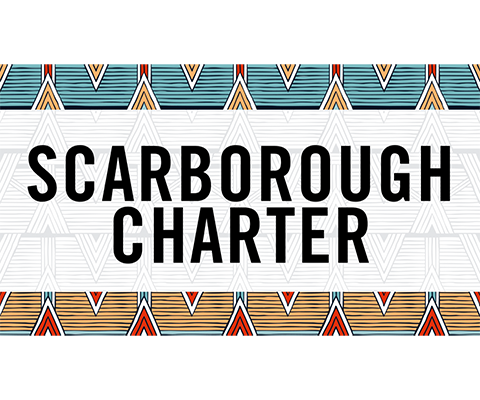
Welcome to the 20th issue of The Catalyst Anti-racism newsletter.
The Catalyst provides the University community with monthly updates from individuals and teams working across campus to counter systemic racism and oppression and highlights excellence from Black, Indigenous and other racialized groups.
Click here to read past issues of the Catalyst.
In this issue:
- Message from Vivek Goel, President and Vice-Chancellor
- Understanding the true meaning of excellence
- Building a home and a future in Canada
- Meet Eden Mekonen
- Exploring decarbonization pathways in developing nations
- Celebrating Black History through art
- Bulletin Board
Subscribe to The Catalyst to receive each issue directly to your inbox

Message from the editor
Each February, we participate in activities to celebrate the accomplishments and honour the struggle and resilience of Black people in Canada. This commemoration of Black history is highlighted by the 2023 theme of “Ours to tell”, which encourages open conversation and understanding of the stories and legacies of Black people. In recognition of Black History month, the message from the editor, for this issue, comes from Vivek Goel, President and Vice-Chancellor.
Black History Month Message from Vivek Goel, President and Vice-Chancellor
The beginning of February marks the start of Black History Month 2023. The University of Waterloo is pleased to celebrate the diversity of people of African descent in Canada and their importance to the history and prosperity of this country.
While Canada is the strong and thriving country it is today largely because of the incredible diversity of people residing here, there is no doubt that Black people have made, and continue to make significant contributions to the growth and development of our country.
In 1995, former MP Dr. Jean Augustine, the first Black woman to be elected to parliament, introduced a motion to recognize February as Black History Month, across Canada. Today, Black History Month helps to provide a more complete account of the contributions that generations of Black people have made to Canada, which has historically been ignored.
Black History Month is a time to celebrate Black Excellence, a term used to describe the individual achievements and successes, contributions and perseverance of the Black community.
As we celebrate Black Excellence, we must also reflect on the centuries of struggle and sacrifice that they have endured as a people and continue to face today. The tragic murder of Tyre Nichols at the hands of Memphis police and other incidents of hate-motivated violence recently in the news are a terrible and visceral reminder of the plague of racism in our society.
Beyond the 28 days of February, I urge you to remember that Black people live their Blackness every day. Collectively, they are subjected to racism, discrimination, suspicion, profiling and a myriad of inequities, because of the colour of their skin. I encourage you to reflect on the courage and resilience of our Black community, who have prevailed and thrived in the face of oppression and injustice.
Although UWaterloo has shown its commitment to confronting Anti-Black racism by signing on to the Scarborough Charter and working to implement the recommendations of the President’s Anti-racism Taskforce (PART), I recognize the tremendous amount of work that we have yet to do to continue to advance Black inclusion.
Racism and oppression have no room in our community. We must work together to help end racial profiling, eradicate barriers to employment and advancement and dismantle policies and processes that perpetuate disparities during Black History Month, and beyond.
We need the full commitment and support from the University community to continue to build and sustain a welcoming community that embraces diversity and inclusion. Together, we will overcome discrimination and oppression and create a fairer and more inclusive Canada for all.
Anti-racism across campus
Understanding the true meaning of excellence
By Tracelyn Cornelius

We are nearing the end of Black History month 2023, celebrated under the theme “Ours to tell”. According to the government of Canada, this theme represents an opportunity to not only engage in open dialogue, but to also commit to learning more about the stories of Black communities in Canada - their histories, successes, sacrifices and triumphs.
Celebrating Black excellence is a way to recognize and appreciate extraordinary achievements or performances, and to motivate and encourage others to strive for greater success. Nevertheless, some critics of the Black excellence narrative suggest that it can create a sense of competition amongst Black people, resulting in feelings of superiority and marginalization. Others argue that society's relentless pursuit excellence can sometimes be damaging to the mental health and well-being of some people. This pressure to be exceptional can lead to feelings of guilt, inadequacy and failure, particularly among the younger generation. Further, an obsession with excellence can lead to a culture of exclusion and further divide the community, rather than unite it.
I asked my son, a Black young adult, to share his perspective. He believes that while Black excellence is a great way to recognize the achievements of Black people and to give them the recognition they duly deserve, it pressures individuals to achieve similar, often unrealistic standards, regardless of individual circumstances. He describes the pressure he feels to conform to society’s standard of what a good Black man should be.
He added that Black excellence also reinforces stereotypes and implies that Black people are only capable of achieving excellence in certain fields, like sports and entertainment. He further explained that quite often he feels that he must constantly prove his worth as a member of the Black community. He says, unlike him, his white friends are not burdened by standards of excellence, they are allowed to simply exist.
His comments were profound, but true. Much of what he said, feeds into the myth of meritocracy, the belief that success is based solely on individual merit, with no barriers to social mobility. Meritocracy is often used to defend the idea of a fair and equal society, where everyone has an equal opportunity to succeed, ignoring the reality that access to resources, privilege, and other forms of social capital can give certain individuals an advantage over others.
I also reached out to Dr. Christopher Taylor, associate vice-president, Equity, Diversity, Inclusion and Anti-racism for expert advice on this discourse. He said, “Why do we need to even use the term Black excellence? By using the term, aren't we simply reinforcing the idea of excellence? “What about celebrating Black joy, Black liberty, Black freedom, or even Black existence?”
Dr. Taylor believes that Black excellence can be damaging, especially when it is used to push a specific narrative about what Black people should be or do, which can perpetuate stress, anxiety, unhealthy competition and feelings of self-doubt and inadequacy.
After carefully considering both sides of the debate, I personally do not support retiring the term, because of it may cause a form of pressure that can be harmful to Black people. I believe that excellence comes in different forms and that everyone should be celebrated for their unique achievements and contributions. As we strive to create more inclusive and supportive environments, academic achievement, wealth and career success cannot be the sole metrics for measuring excellence. Other forms of success, such as emotional, spiritual and physical well-being should also be celebrated and embraced as unique forms of excellence.
As denoted in the Black History Month theme this year, the story is “Ours To Tell.” We as Black people need to take control of the narrative and build awareness that achieving personal goals and accomplishments, and simply existing in a world plagued with discrimination and inequities are the sincerest forms of excellence. We must remember that Black excellence is not a standard to be met, but an opportunity to celebrate our individual and collective successes, both big and small.
Student feature
Building a home and a future in Canada

When Kay Awe (PhD Candidate) came to Canada from Nigeria seven years ago, it was December — and it was the first time he’d ever seen snow.
About to start his master’s in civil engineering, not even the harsh Canadian winter could deter him. “Waterloo was where I wanted to come,” he says. “It’s one of the best schools in engineering in Canada and I knew it would prepare me for the future.”
Today, the PhD candidate and Canadian citizen, who lives with his wife and their three kids — all under the age of five — says, “Canada is where I call home.”
Employee feature
Meet Eden Mekonen, a career advisor at CCA who is helping Black students achieve their goals

Eden Mekonen is a career advisor at the University of Waterloo’s Centre for Career Action (CCA), and one of two harassment advisors who are working with students to help them identify career paths and make decisions.
Having worked at the University for the past six years, Mekonen recognizes the need for trauma-informed career advisors to support students who have been affected by trauma, while helping to create a safe, non-judgmental place to explore and discuss career-related challenges. Along with other colleagues, she also helps students address harassment, whether it be physical, psychological or emotional.
Research spotlight
Exploring decarbonization pathways in developing nations

There are still one billion people with unreliable energy supply in the world, but Bayo Akomolafe is well equipped to address this gap. With 10 years of experience working in the power generation industry and his lived experience growing up in energy poverty in Nigeria, Akomolafe’s pursuit of creating affordable, reliable, and sustainable modern energy systems for developing nations is well fuelled.
In the middle of the COVID-19 pandemic, he begun part-time graduate studies in the School of Environment, Enterprise, and Development (SEED) to advance this passion. With the help of his supervisor, Dr. Amelia Clarke, and the research team in SEED, his return to academic life and transition from a core engineering base into socio-technical studies was seamless. His research narrowed in on deep decarbonization pathways, or strategies, that can propel sustainable development and energy transitions in four leading Sub-Saharan African cities with a combined population of about 30 million.
Alum Feature
Celebrating Black History through art

Born and raised in Kitchener-Waterloo, Kemahee Baker (BA’ 17) is a multi-talented artist and dancer, whose creative output is heavily influenced by her culture, music and her personal commitment to celebrating the achievements of Black people.

During her tenure at the University of Waterloo, Baker flourished academically, earning a Bachelor of Arts in Spanish, Latin American Literatures and Cultures with a minor in Psychology. She was recognized as a Dean's List scholar and received several awards of merit.
Following a car accident that left her with debilitating chronic pain, Baker sought psychotherapy to aid her recovery. As a form of art therapy, she began to explore painting, which gave her an outlet for self-expression and helped her to cope during her recouperation. It was through this experience that she was inspired to launch her own business, the online art store Every Good n’ Perfect Gift, while completing post-graduate studies.
Bulletin board
1. Scarborough Charter design contest

The Scarborough Charter on anti-Black racism and Black inclusion Steering Committee is inviting eligible student artists and designers to “participate in a design opportunity that will lead to the design of a logo that reflects the principles, commitments, and objectives of the Scarborough Charter and its goal of Black Flourishing in Canadian higher education and communities.”
“The logo will be used in both print and digital formats, including for print materials, event promotion, social media sites and on the Scarborough Charter website.”
2. Anti-racism Reads

Join the Anti-Racism Reads online event facilitated by Jermal A. Jones, Associate Director, Equity, Diversity, Inclusion and Access from the University of Waterloo Library.
Jermal will lead the group discussion on the book I'm Still Here: Black Dignity in a World Made for Whiteness by Austin Channing Brown.
We are working towards removing barriers to participation, providing easy access to the selected text. We have limited copies available free of cost for those who sign up for the event and indicate they'd like a copy on the registration form.
When: Tuesday, Feburary 28 | noon to 1 p.m.
Where: Microsoft Teams
3. LiftOff Program for Black entrepreneurs
Are you an aspiring entrepreneur? Are you an entrepreneur looking to grow and scale?
Apply to the LiftOff Program for Black Entrepreneurs for the opportunity to start, grow or develop your business.
It only takes 20 minutes! Learn about previously accepted entrepreneurs.